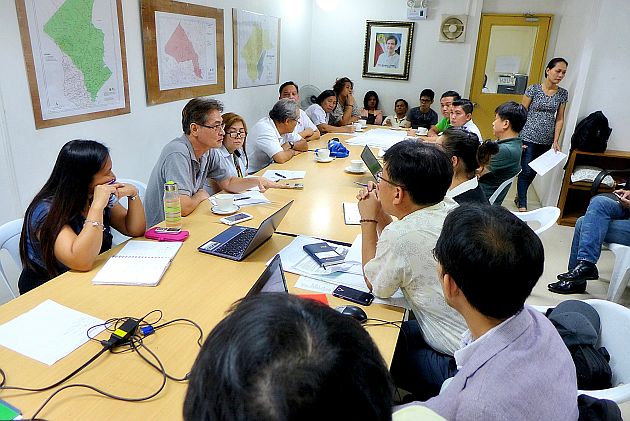
Technical Working Group meets on the Cebu BRT Project.(PHOTO BY RUDY ALIX OF MLC)
THE Narra trees along Osmeña Blvd. will neither be cut nor removed, officials of the Cebu Bus Rapit Transit (BRT) project assured.
Rudy Alix, co-convenor of the Movement for a Livable Cebu (MLC), said in a Facebook post that the fight to save the trees was “99-percent won.”
“This was the decision arrived at during the BRT TWG (technical working group) meeting today (June 23). I’m sorry I can’t say 100 percent. You know how things are around here,” Alix stated on his Facebook.
Alix noted that the engineers doing the detailed engineering study for the BRT project come from Seoul, South Korea, where a greening program is being undertaken.
Representatives from Kunhwa Engineering and Consulting Ltd. arrived in Cebu since last month to conduct the detailed engineering design study for the P10-billion BRT project. It’s expected to last for eight months.
Kunhwa is expected to bring in a landscape expert to assess the trees and their locations.
The consultants, together with the BRT implementing office headed by Cebu City Traffic Operations Management (Citom) executive director Rafael Yap, met with representatives of some government agencies and civil society groups last week for a consultation and dialog.
Alix, who attended the meeting, pushed for the non-cutting of the narra trees on Osmena Blvd. His group has been instrumental in preserving roadside trees. They stopped the cutting of several century-old Acacia trees in the southern areas of Naga City, San Fernando and Carcar City late last year.
“The general sentiment is to save the Narra trees. (There’s still) 1% since a specialist from Kunhwa will still come here to make recommendations,” confirmed Cebu BRT project head Rafael Yap.
The group didn’t object to the removal of the trees on the center island of Osmena Blvd. as long as appropriate permits are secured from the Department of Environment and Natural Resources (DENR).
These are mostly Indian trees, which are not endemic to the country.
The Department of Public Works and Highways (DPWH) was also in the meeting together with representatives from sectoral groups of senior citizens and persons with disabilities (PWDs).
The two groups’ representatives raised concerns that the BRT structures would not be PWD- and senior citizen-friendly and not compliant with the Accessibility Law.
Bridges along the BRT route from Bulacao to Talamban should also be strengthened since most of these are old and no engineering plans could be provided, Alix said.
DPWH representatives said the designated road for the buses is 3.25 meters with 1.5 meters for sidewalks. The groups proposed to reduce the width to 3 meters but the DPWH said Kunhwa still needs to write to them a letter for approval.
“BRT speed and punctuality are crucial to success in operation, so a review of maximum allowable speeds within city limits is needed,” Alix added.
MLC also suggested the need for a better traffic plan in the Fuente Osmeña Circle. Alix said pedestrianization of a quadrant of the rotunda will cause traffic conflicts that can affect flow in the other half of Osmeña Blvd. as well as in Gen. Maxilom Ave. and even in MJ Cuenco Ave.
They also suggested a signalized crossing nearby to allow access to the BRT stations and the Fuente Osmeña park but other actions will still be looked into.
Several consultative meetings will still be held by the BRT office and Kunhwa, said Yap. Regular updates and reports will also be given by the Korean firm as it undertakes the study.